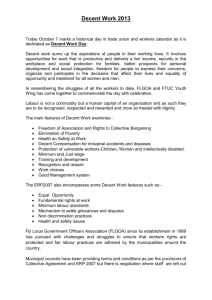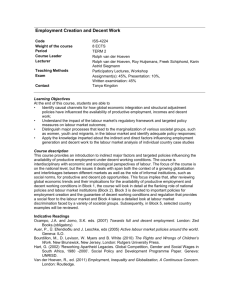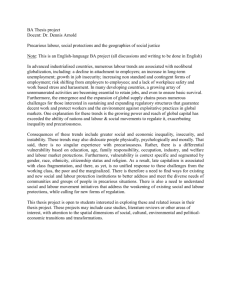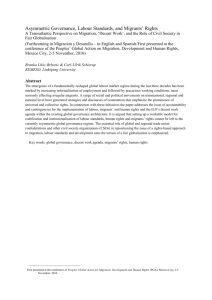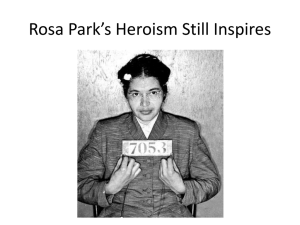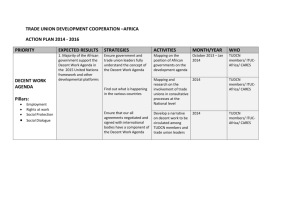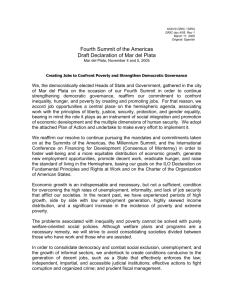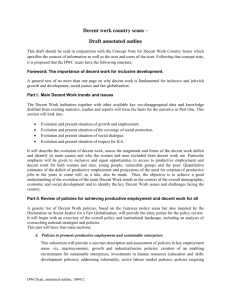Update on post-2015
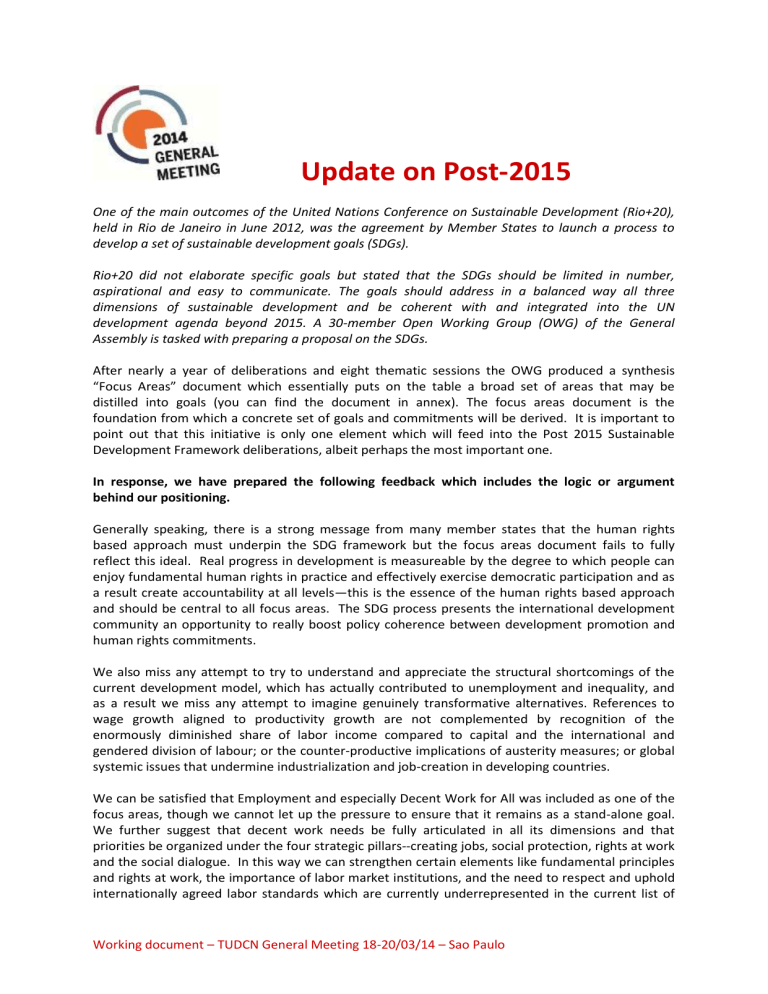
Update on Post-2015
One of the main outcomes of the United Nations Conference on Sustainable Development (Rio+20), held in Rio de Janeiro in June 2012, was the agreement by Member States to launch a process to develop a set of sustainable development goals (SDGs).
Rio+20 did not elaborate specific goals but stated that the SDGs should be limited in number, aspirational and easy to communicate. The goals should address in a balanced way all three dimensions of sustainable development and be coherent with and integrated into the UN development agenda beyond 2015. A 30-member Open Working Group (OWG) of the General
Assembly is tasked with preparing a proposal on the SDGs.
After nearly a year of deliberations and eight thematic sessions the OWG produced a synthesis
“Focus Areas” document which essentially puts on the table a broad set of areas that may be distilled into goals (you can find the document in annex). The focus areas document is the foundation from which a concrete set of goals and commitments will be derived. It is important to point out that this initiative is only one element which will feed into the Post 2015 Sustainable
Development Framework deliberations, albeit perhaps the most important one.
In response, we have prepared the following feedback which includes the logic or argument behind our positioning.
Generally speaking, there is a strong message from many member states that the human rights based approach must underpin the SDG framework but the focus areas document fails to fully reflect this ideal. Real progress in development is measureable by the degree to which people can enjoy fundamental human rights in practice and effectively exercise democratic participation and as a result create accountability at all levels—this is the essence of the human rights based approach and should be central to all focus areas. The SDG process presents the international development community an opportunity to really boost policy coherence between development promotion and human rights commitments.
We also miss any attempt to try to understand and appreciate the structural shortcomings of the current development model, which has actually contributed to unemployment and inequality, and as a result we miss any attempt to imagine genuinely transformative alternatives. References to wage growth aligned to productivity growth are not complemented by recognition of the enormously diminished share of labor income compared to capital and the international and gendered division of labour; or the counter-productive implications of austerity measures; or global systemic issues that undermine industrialization and job-creation in developing countries.
We can be satisfied that Employment and especially Decent Work for All was included as one of the focus areas, though we cannot let up the pressure to ensure that it remains as a stand-alone goal.
We further suggest that decent work needs be fully articulated in all its dimensions and that priorities be organized under the four strategic pillars--creating jobs, social protection, rights at work and the social dialogue. In this way we can strengthen certain elements like fundamental principles and rights at work, the importance of labor market institutions, and the need to respect and uphold internationally agreed labor standards which are currently underrepresented in the current list of
Working document – TUDCN General Meeting 18-20/03/14 – Sao Paulo
priorities. In addition, employment and decent work need to be better integrated across relevant focus areas. References to job creation in other focus areas do not seem consistent with the spirit of decent work as articulated under focus area 11. Specifically, for example, the link between employment and the different issues related to the environmental pillar needs to be strengthened as we know adequate investment to achieve a low carbon future has the potential to create millions of decent and green jobs.
Social protection is severely underplayed in this focus area and across focus areas in general. At this stage it confirms our fear that without a dedicated commitment or focus to Universal Social
Protection, the issue would be lost in a thicket of many cross-cutting issues. It should not be confined to “those retired from the labour force, persons with disabilities and older persons”.
Through the creation of social protection floors governments have a concrete policy measure to effectively eradicate poverty and address inequality. A sustainable development framework that does not include specific commitments to Universal Social Protection, through the creation and implementation of Social Protection Floors, will be a major oversight. At the very least more concrete references to social protection must be introduced in several additional focus areas especially as it is an issue that responds to the three pillars. We emphasize that the Social protection
Floor approach is neither a prescription nor a universal standard but rather an adaptable policy approach that is country-owned and responsive to national priorities and resources.
Education is also included as a separate focus area, and likewise we must work to ensure that it remains as a stand-alone goal. The big missing piece in the focus area is free education, as tuition fees and indirect costs of education continue to exclude the most marginalized from quality education.
Gender is also a focus area, and we are supporting a stand-alone goal to achieve gender equality, including the empowerment of women and the full realisation of women’s human rights. We would like to see that such goal be framed to generate a re-organisation of power, wealth and resources, with the aim of ending all forms of discrimination and violence.
The focus area on promoting equalities is also welcome and we suggest that it should also be addressed through the lens of labour market institutions, and employment and decent work. The rationale being that wage inequality explains a big part of income inequality. In other words, that the quality of the jobs created has not been significant enough to reduce income inequality, as wages have remained at a low level and labour market tenure weak. In response we are proposing that a focus on promoting equality be founded on an integrated social protection floor, minimum living wages and collective bargaining along with other social policies as needed.
There is a focus area on Economic Growth which we find strange or at least the idea that economic growth should be considered a goal of the Post 2015 SDG Framework. Economic growth is a means and not and end in itself to poverty reduction and if not qualified, can potentially undermine environmental and social targets and contribute to greater inequality. Having said that, economic growth, especially as relates to the focus areas on industrialization and infrastructure, can be labour intensive and create decent work if complemented by sound macroeconomic and social policies.
These include
strengthening collective bargaining and minimum living wages;
targeted investments in infrastructure to improve long-term productive potential and move to a low-carbon economy;
investing in active labour market policies to raise skill levels, support women’s participation in the labour market and reduce youth unemployment and precarious work
Working document – TUDCN General Meeting 18-20/03/14 – Sao Paulo
investing in and supporting quality public services including education, health and energy to name a few
A revised version of the Focus Areas document, based on the recent discussions, will be likely be available on 19 March and will serve to inform the next session of the OWG. We expect that we will be much closer to a set of proposed goals by the end of the next session (31March-4 April).
Working document – TUDCN General Meeting 18-20/03/14 – Sao Paulo

